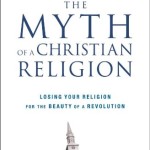We run our website the way we wished the whole internet worked: we provide high quality original content with no ads. We are funded solely by your direct support. Please consider supporting this project.
Jesus & Racial Reconciliation
If you were to read an account today of a white man offering his front row seat on a public bus to an elderly African American lady, you’d probably think this was a nice gesture, but nothing more. However, if you learned that the event happened in Birmingham Alabama in 1955, you’d interpret this act in a very different way. You’d now understand that this act went far beyond being nice. This was an act of revolt against the dominant racism of the time.
In the same way, many today interpret Jesus’ behaviors as nice, when in fact, if you understand them in their original context, they were revolutionary. Nowhere is this more evident than in the way Jesus revolted against racial judgments in his day.
For example, most Jews of Jesus’ day despised Samaritans as racially impure and as heretics. They avoided any physical contact or interaction with them. Yet, Jesus went out of his way to interact with them. He had physical contact with them (even when they were leprous!) and ministered to their needs. And he treated them with great respect, even holding some out to be the heroes in his stories. For first century Jews, this was scandalous behavior.
Most remarkably, Jesus was willing to interact with, and lovingly minister to, Roman Centurions. A Centurion was a high ranking official in the Roman military that enforced Roman rule on Jews. No one would have been more despised by ordinary Jews than these people. Yet, Jesus went so far as to praise the faith of a Roman Centurion as greater than that of any Jew he had met! For most first century Jews, nothing could have been more offensive.
Understood in its original context, Jesus wasn’t merely “nice” to non-Jewish people. Rather, his interaction with other ethnic groups was revolutionary. His life was a prolonged revolt against the racism of his day. And in this way Jesus was revealing an aspect of what it looks like when God reigns on the earth while revolting against the Powers that fuel all forms of racial hostility and oppression. Jesus’ life reveals that where God’s Kingdom is present, all racial judgments and barriers are overcome and all people are treated as equals.
Now, my experience has been that most American Christians today – especially (to be frank) most white American Christians (of whom I’m a card carrying member) – think of “racial reconciliation” as at best a nice addendum to the Gospel. At worst, some think of it as “a liberal sell-out to political correctness,” as one person once told me.
To the contrary, the reunification and reconciliation of the scattered people groups lies at the heart of God’s program for the world. It therefore lies at the heart of the Kingdom God has unleashed into the world and thus lies at the heart of what we’re supposed to be about!
Jesus died to create “one new humanity.” In this light, we have to understand the call to preach and pursue racial reconciliation to be as important as the call to preach and pursue everything else Jesus died for. We can no more refrain from preaching reconciliation than we can refrain from preaching (say) the forgiveness of sins. And we must therefore consider anyone’s refusal to proclaim and pursue racial reconciliation to be as heretical as we would deem the refusal to proclaim and work for people being forgiven of their sins.
It really is that serious!
But lets get honest. How many of our churches in America are as passionate about proclaiming and working toward racial reconciliation as they are about proclaiming that Jesus died for the forgiveness of sins? The answer, tragically, is relatively few. What makes this even more tragic is that, as is often pointed out, Sunday morning is the most segregated time in America. Fifty years after the Civil Rights Movement, the Church remains the least racially integrated institution in the country! In other words, the broader secular cultural does a better job of reflecting the coming Kingdom than we Christians do!
Some try to minimize the tragedy of this fact by claiming that its just “natural” for people from different cultures to worship with their own people. In fact, some leading church growth experts teach what’s called the “homogeneous unity church growth” principle, saying that the most effective way of building a church is to aim at building it around one people-group. They point out that it’s harder to get many people to join a church if it’s racially and culturally diverse.
Now, there’s no question that people are generally more comfortable worshiping with people who look, think and act like they do. And, therefore, I don’t doubt for a moment that shooting for homogeneity is a more efficient way of growing a church. But when did Jesus ever call us to be comfortable or encourage us to make non-believers comfortable in order to get them to accept the Gospel? And when did Jesus ever call us be worried about how to be efficient at growing large churches?
We are called to be faithful, not efficient. We are to manifest the “one new humanity” Jesus died to create – whether it makes people comfortable or not, and whether it increases or decreases the size of our congregations.
This is part of the Synchro blog for MennoNerds on Race. Click here to watch a video on this topic.
Category: General
Tags: Church, Kingdom Revolution, Mennonerds, Racial Reconciliation, Racism, Social Issues
Topics: Ethical, Cultural and Political Issues
Related Reading

Are you a pietist?
Question: Soon after the publication of your book The Myth of a Christian Nation, I heard Chuck Colson charge you with being a “pietist.” Since then, others have repeated the charge. They all claim you advocate a Gospel that focuses on individual salvation but leaves social issues for government to address. Are you a pietist?…

Tribalism
Sandra Unger spoke for Greg while he was on vacation the week after the 4th. In this clip, Sandra explains whats tribes are and how that creates unintended separation between people. In the full sermon, she speaks about what it means to be part of the Jesus Tribe. She discusses the reasons people are prone to…

A Cross-Like Church
When God’s church loves like God loves—which means valuing the other at cost to self—it will puzzle those outside the church. While such love might cause the religious to rail with outrage, it will cause the searching and the hungry to ask, “how can people love like this?” In God’s plan, this puzzle is what…

Does religious faith make someone a better politician?
Question: A recent poll showed that a majority of Americans agreed with the statement: “Religious faith makes someone a better politician.” In fact, a majority said they would never vote for a candidate who had no religious faith. Do you agree that religious faith helps make someone a better politician? Answer: As a Christian pastor,…

Quotes to Chew On: The Church vs. Religion
“It’s time for the Church to free itself from the religious holiness of the Pharisees and begin to manifest the holiness of the Kingdom. It’s time for us to realize that our calling is to serve people sacrificially–including prostitutes, tax collectors, and enemies–rather than judging them. It’s time we ceased getting Life from the rightness…

Sermon: We The Church
The Anabaptists saw that the building is not the Church. God wants to dwell on this Earth, but it is not in a building. It is in his people. In this brief clip, Greg traces the origins to see how “church” became associated with buildings. Let’s recover our identity as the place where God dwells!…

